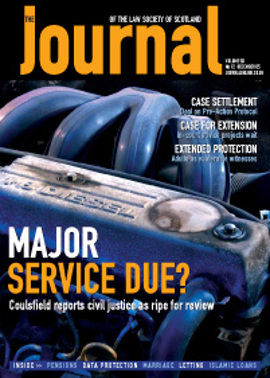Scottish Solicitors Discipline Tribunal

NICANDRO MATTEO
A complaint was made by the Council of the Law Society of Scotland against Nicandro Matteo, solicitor, 71 South Bridge, Airdrie (“the respondent”). The Tribunal found the respondent guilty of professional misconduct in respect of his failure to respond to the reasonable requests of the Society for information and failure to respond to statutory notices. The Tribunal censured the respondent.
The Tribunal has made it clear on countless occasions that failure to respond to the Law Society of Scotland seriously inconveniences the Society in the performance of its statutory duty, is prejudicial to the reputation of the legal profession and clearly amounts to professional misconduct. The Tribunal however took into account the circumstances in this case and was satisfied that this was an isolated incident. The failure to respond related to one matter and it was clear from the eminent references provided that this conduct was out of character for the respondent. In the circumstances the Tribunal was satisfied that a censure together with the usual order for expenses and publicity would be sufficient penalty in this case.
ALEXANDER GILMOUR MALCOLM
A complaint was made by the Council of the Law Society of Scotland against Alexander Gilmour Malcolm, solicitor, formerly of 23 Tarvit Drive, Cupar and now at 14 Melgund Place, Lochgelly, Fife (“the respondent”). The Tribunal found the respondent guilty of professional misconduct in respect of his act of deception by providing his client with deliberately untrue information contrary to article 7 of the Code of Conduct for Solicitors holding practising certificates, issued by the Law Society of Scotland in 2002. The Tribunal censured the respondent and directed in terms of section 53(5) of the Solicitors (Scotland) Act 1980 that for a period of five years any practising certificate held or issued to the respondent shall be subject to such restriction as will limit him to acting as a qualified assistant to such employer as may be approved by the Council or the Practising Certificate Committee of the Council of the Law Society of Scotland.
In this case the respondent misled his client by stating to his client that he had carried out a particular act where in fact he had not done so and was aware that he had not done so. This caused his client distress and inconvenience. The Tribunal was of the view that this clearly amounted to professional misconduct. The respondent had previously been found guilty of professional misconduct by the Tribunal in connection with analogous matters, although the Tribunal noted that the events in the complaint were proximate in time to the conduct concerned in the previous findings. The respondent was already subject to a restriction on his practising certificate until August 2007. The Tribunal considered that the most appropriate way of dealing with the case was to increase the length of the respondent’s restriction.
In this issue
- Holes in Scotland's corporate killing proposals
- A month of contrasts
- Too small to be flexible?
- Engine overhaul
- Vital voices revisited
- Letting in the law
- Puzzles and paradoxes
- Legacy giving in a Scottish climate
- New deal for PI claims
- Data protection crackdown: do you comply?
- In real terms
- Access route
- Better law-making: just lip service?
- Appealing prospects
- The limits of diversification
- Cashing in on the event
- Farewell then common law marriage
- Scottish Solicitors Discipline Tribunal
- Website reviews
- Book reviews
- Unveiling the Islamic mortgage






